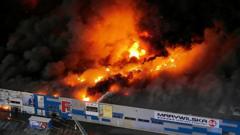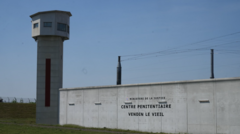Prime Minister Donald Tusk of Poland has accused Russian intelligence agencies of orchestrating an arson attack that devastated the Marywilska shopping centre in May 2024, leading to extensive damage and impacting local businesses. A year-long investigation revealed that those involved had ties to Russia, with ongoing searches for additional suspects.
Poland Blames Russia for Arson Attack on Warsaw Shopping Centre

Poland Blames Russia for Arson Attack on Warsaw Shopping Centre
Allegations surface following a massive fire in Warsaw’s Marywilska shopping centre, with Poland asserting Russian involvement.
Poland has leveled serious accusations against Russian intelligence services, claiming their involvement in a significant fire that nearly obliterated the Marywilska shopping centre in Warsaw last year. In a statement on X, Prime Minister Donald Tusk asserted that Poland is "certain" that the conflagration, which erupted in May 2024, was a result of arson orchestrated by Russian special services. Tusk mentioned that some individuals allegedly responsible have already been apprehended, while authorities are actively pursuing others.
Although Russia has yet to respond to these allegations, it has historically denied being involved in sabotage activities across Europe. The catastrophic fire has left 1,400 small businesses in ruins, many of which were operated by members of the Vietnamese community in Warsaw. Poland's investigation, spanning an entire year, concluded that the organized fire was directed by a specific unnamed individual residing in Russia. According to a coordinated statement from Poland’s justice and interior ministers, efforts were underway to identify and capture all those involved, with Lithuania being mentioned as a cooperative partner in tracking down some alleged perpetrators.
Since the onset of Russia's full-scale invasion of Ukraine in 2022, Poland has seen a wave of detentions and convictions linked to individuals accused of carrying out sabotage at the behest of Russian intelligence. Polish officials have framed these incidents as part of a broader "hybrid war" strategy employed by Moscow, characterized by covert and deniable acts targeting essential infrastructure.
NATO members have concurred that Russia is actively engaging in hybrid warfare tactics across Europe, aiming to dissuade Western support for Ukraine. In March, Lithuania’s prosecutors similarly attributed an arson attack at an Ikea branch in Vilnius to Russia’s military intelligence, corroborating Tusk's claims about links between the suspected arsonists in Warsaw and their Lithuanian counterparts.
The Marywilska shopping centre, which opened in 2010, suffered significant losses during the fire, with workers losing vital documents and substantial cash stored on-site due to concerns over potential thefts at home. In response to the devastation, the owners of Marywilska have set up a temporary shopping centre allowing approximately 400 traders to resume their businesses, while another alternative venue, Modlinska 6D, opened later in October 2024.




















